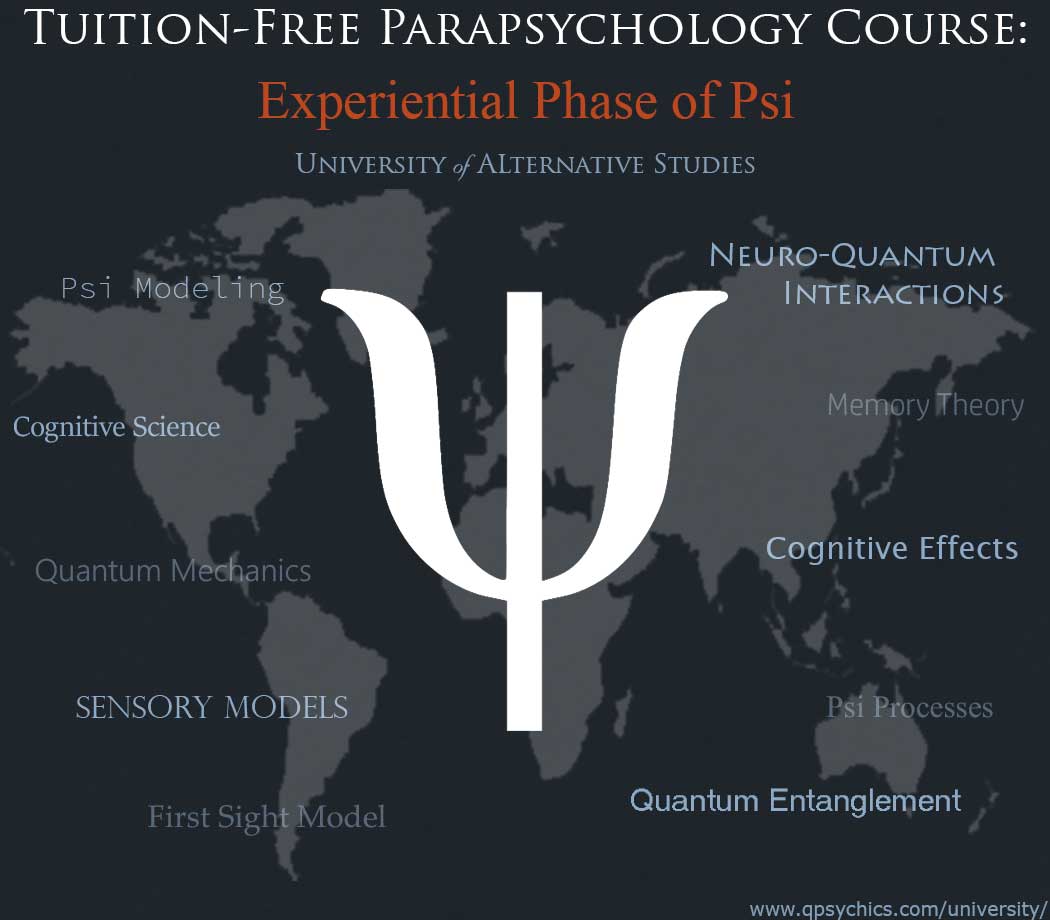Psi is an all-encompassing term for extrasensory perception and psychokinesis combined. This course addresses the psychological aspects of how and when human beings are able to utilize psi through promising models including models involving quantum mechanical approaches to cognition, and memory models. Such models of psi manifestation attempt to explain how extrasensory information enters the central nervous system or information processing center, and how the system deals with that information. In regards to psychokinesis, such models attempt to explain what manner of information processing is taking place, and what the requirements for the information to be transmitted into the environment are. Addresses the biological utilization of non-local communication, the reverse direction problem, the binding problem, the human brain and neuro-quantum interactions, and brain stimulation via circumcerebral magnetic fields. Addresses the question whether a quantum-like approach is actually more advantageous over classical approaches, and addresses quantum mechanical principles, properties, and features resulting in cognitive effects related to content sensitivity, association, the human lexicon, and psychological function in general. Addresses quantum-like mental entanglement, how this new quantum mechanical approach is shedding light on an array of anomalous experimental results composed over the greater portion of a century, pseudo-sensory models, memory models involving memory theory and associated phenomenology, receptive psi processes, memory and psi processes, the first sight model, psi requirements, and the part played by the default mode network.
Course Admission Requirements: Anyone may enroll in an Introductory Course regardless of age, location, and prior education. For more information, please see Recommended Prerequisites and Academic & Career Expectations.
 Enroll in Parapsychology!
Enroll in Parapsychology!
Open Access. No Application Required.
All Study Materials Included (e.g. Text, Assignments, Exams).
UAS Certificate of Course Completion.
Total Hours: 4.6hrs. | Weeks: 4.5
Student Interaction Available.
Course Enrollment Period: 90 days
Course Fees: $25 Certificate Fee (optional)
Course Developer: Theresa M. Kelly
:: Curriculum
Introduction to Parapsychology: Experiential Phase of Psi – Quantum Mechanical and Cognitive ApproachesView Content
:: Study Material References
View ContentBaierlein, R. (2003). Thermal Physics. Cambridge University Press.
Blutner, R. (2010). Quantum Mechanics Meets Cognitive Science: Explanatory vs. Descriptive Approaches. Journal of NeuroQuantology.
Blutner, R., Hochnadel, E., (2010). Two Qubits for C.G. Jung’s Theory of Personality. Cognitive Systems Research.
Bruza P. (2010). Idealistic Quantum Psychopathology: A Way Forward? Journal of NeuroQuantology.
Carpenter, J.C. (2009). Relations Between ESP and Memory in Light of the First Sight Model. Journal of Parapsychology.
Conte E.(2010). On the Possibility that we think in a Quantum Probabilistic Manner. Journal of NeuroQuantology.
Conte, E. (2008). Testing Quantum Consciousness. Journal of NeuroQuantology.
Conte, E, Khrennikov, AY, Todarello, O, Federici, A, Zbilut, JP. (2009). On the Existence of Quantum Wave Function and Quantum Interference Effects in Mental States: An Experimental Confirmation during Perception and Cognition in Humans. Journal of NeuroQuantology.
Conte, E., Todarello, O., Federici, A., Vitiello, F., Lopane, M., Khrennikov, A. Zbilut, JP., (2007). Some Remarks on an Experiment Suggesting Quantum-like Behavior of Cognitive Entities and Formulation of an Abstract Quantum Mechanical Formalism to Describe Cognitive Entity and its Dynamics. Chaos, Solutions, Fractals.
Dunne, B. and Jahne, R. (2007). Margins of Reality. The Role of Consciousness in the Physical World. Harcourt Brace & Co.
Irwin, H., Watt, C. (2007). An Introduction to Parapsychology. McFarland & Company Inc.
Khrennikov, A. (2010). On the Physical Basis of Theory of “Mental Waves”, Journal of NeuroQuantology.
Radin D. (2006) Entangled Minds. Extrasensory Experiences in a Quantum Reality. Paraview Pocket Books.
Radin, D. (2004). Event-Related Electrocephalographic Correlations Between Isolated Human Subjects. Journal of Alternative and Complementary Medicine.
Radin, D., Storm, L., Tressoldi, P. (2010). Extrasensory Perception and Quantum Models of Cognition. Journal of NeuroQuantology.
Raffone, A, Srinivasan, N. (2009). The Exploration of Meditation in the Neuroscience of Attention and Consciousness. Marta Olivetti Belardinelli and Springer-Verlag.
Rahnama, M., Salari, V., Tuszynski, J. (2009). How Can the Visual Quantum Information be Transferred to the Brain Intact, Collapsing There and Causing Consciousness? Journal of NeuroQuantology.
Rosemblum, B., Kuttner, F. (2008) Quantum Enigma: Physics Encounters Consciousness. Oxford University Press.
Thanheld, F.H. (2010). Quantum Non-Locality: Does Nature also Perform the trick via a Biological Route? Journal of NeuroQuantology.
Kelly, T. (2011). Telepathy: A Quantum Approach. University of Alternative Studies.
Course Fees: $25 Certificate Fee (optional)

